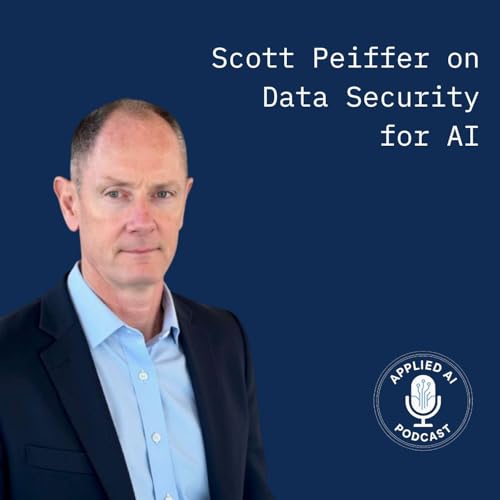
Data Security in AI: Talbot West CEO Jacob Andra Interviews Scott Peiffer of i4Ops
カートのアイテムが多すぎます
カートに追加できませんでした。
ウィッシュリストに追加できませんでした。
ほしい物リストの削除に失敗しました。
ポッドキャストのフォローに失敗しました
ポッドキャストのフォロー解除に失敗しました
-
ナレーター:
-
著者:
このコンテンツについて
Most enterprise AI projects fail because companies hold back their data. They spend hundreds of thousands of dollars training models on sanitized datasets, afraid to expose sensitive information. They get generic answers that create no competitive advantage.
In this episode, Scott Peiffer from i4Ops cuts through the AI hype to address the real challenge facing enterprises: how to deploy AI systems that actually create value while keeping proprietary data secure.
What you'll learn
Scott Peiffer brings 35 years of data storage and security experience from Intel, NetApp, and now i4Ops. He explains why the current approach to enterprise AI deployment produces disappointing results and what companies should do instead.
The FOMO problem Companies receive mandates from the C-suite to "do AI" without clear objectives or strategy. Research shows 90% of these models fail to deliver value because organizations train them on limited data subsets, withholding their most valuable information out of security concerns. Employee data, sales conversations, customer support transcripts, and strategic documents remain locked away, resulting in AI systems that cannot deliver insights specific to the business.
The challenge compounds when companies lack a systematic approach. They bolt new AI tools onto poorly designed foundations without addressing underlying digital infrastructure issues.
Why digital transformation comes first Successful AI deployment requires a foundation in broader digital transformation strategy. Companies need to start with a clear end vision, map current systems and processes, and create a stepwise progression rather than bolting new tools onto poorly designed foundations. This means defining where you want to go (higher efficiency, preparing for acquisition, competitive advantage), understanding your current state through systems mapping, and identifying a practical path forward that does not break the bank or disrupt operations.
Knowledge management as competitive advantage The future requires every competitive organization to maintain an in-house fine-tuned RAG system trained on company-specific knowledge. This means addressing fundamental questions about documentation, data quality, and information flow before implementing AI solutions. Scott emphasizes that approximately 75% of companies now use local data models rather than cloud solutions when dealing with sensitive information. The security wrapper stays in private data centers where organizations maintain complete control.
The data security gap While data at rest and data in transit receive encryption protection, data in use remains vulnerable. When you download an Excel file to analyze it, that data sits unencrypted on your machine. You can copy it, manipulate it, send it to competitors by accident or malicious intent. When employees ask public AI models to summarize files, that unencrypted data gets ingested into public language models.
i4Ops' approach Rather than plugging holes after they appear, i4Ops uses a patented virtual machine approach that starts with a default of zero data egress. Data cannot leave the protected environment unless explicitly whitelisted, regardless of credentials or authentication methods.
Where AI creates the most value Beyond the obvious cost savings in customer support and repetitive tasks, AI delivers transformational value when companies train models on their complete proprietary datasets to solve specific business problems. Scott describes how his team solved a weeks-long coding problem in hours by training a model exclusively on their kernel code. They asked two questions and had their answer.
Produced by Talbot West, a digital transformation and AI consultancy.



